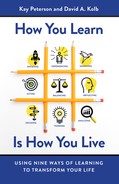Notes
Introduction
1 Arbaugh, J. B., Dearmond, S., and Rau, B. L., “New Uses for Existing Tools? A Call to Study Online Management Instruction and Instructors,” AMLE, vol.12, no. 4, 2013, pp. 635–655.
Chapter One: The Learning Way
1 Oprah Winfrey, BrainyQuote.com., September 10, 2016, www. brainyquote.com/quotes/quotes/o/oprahwinfr133519.html.
2 Kahneman, Daniel, and Jason Riis, “Living and Thinking about It: Two Perspectives on Life,” The Science of Well-Being, edited by N. Baylis, Felicia A. Huppert, and B. Keverne, Oxford University Press, 2005 pp. 285–301.
3 Rogers, Carl, “Toward a Modern Approach to Values: The Valuing Process in the Mature Person,” Journal of Abnormal and Social Psychology, vol 63, no. 2, 1964, pp. 160–167.
4 Maturana, H.R. and Varela, F., Autopoeisis and Cognition. Reidel, 1980.
5 Maslow, Abraham H., Toward a Psychology of Being. Second Edition, Van Nostrand Reinhold, 1968.
6 Rogers, Carl, “Toward a Modern Approach to Values: The Valuing Process in the Mature Person.” Journal of Abnormal and Social Psychology, vol. 63, no. 2, 1964, pp. 160–167.
7 Dewey, John, Democracy and Education. Macmillan Company, 1916.
Chapter Two: I Am a Learner
1 Dweck, Carol S., Self-Theories: Their Role in Motivation, Personality, and Development, Psychology Press, Taylor & Francis Group, 2000.
2 Zull, James, From Brain to Mind: Using Neuroscience to Guide Change in Education, Stylus, 2011.
3 Bargh, J. A. and Chartrand, T. L., “The Unbearable Automaticity of Being,” American Psychologist, vol 54, no. 7, 1999, pp. 462–479.
4 Freire, Paulo, Pedagogy of the Oppressed, The Seabury Press, 1970.
5 Zull, James, The Art of Changing the Brain, Stylus, 2002, pp. 18–19.
Chapter 3: My Learning Style, My Life Path
1 Horton, Miles and Freire, Paulo, We Make the Road by Walking, Temple University Press, 1990.
Chapter Four: Building Learning Style Flexibility
1 Sharma, Garima and Kolb, David A., “The Learning Flexibility Index: Assessing Contextual Flexibility in Learning Style,” in S. Rayner and E. Cools (Eds.), Style Differences in Cognition, Learning and Management: Theory, Research and Practice, Routledge, 2010, pp. 60–77.
2 Kolb, David A. and Wolfe Donald, with collaborators, “Professional Education and Career Development: A Cross-Sectional Study of Adaptive Competencies in Experiential Learning,” final report NIE grant no. NIE-G-77-0053, 1981. ERIC no. ED 209493 CE 030 519. This study is described in Kolb, David A., Experiential Learning: Experience as the Source of Learning and Development, Prentice-Hall, 1984, pp. 184–196.
Chapter Five: Learning Flexibility and the Road Ahead
1 Bridges William, Managing Transitions: Making the Most of Change, Da Capo Lifelong Books, 2009.
2 Dane, Erik, “Reconsidering the Trade-Off between Expertise and Flexibility: A Cognitive Entrenchment Perspective,” The Academy of Management Review, vol. 35, no. 4, October 2010, pp. 579-603.
3 Freire, Paulo, Pedagogy of the Oppressed, The Seabury Press, 1970.
Chapter Six: What’s Next? Deliberate Learning for Life
1 Dewey, John, How We Think: A Restatement of the Relation of Reflective Thinking to the Educative Process, D.C. Heath and Company, 1933.
2 Kabat-Zinn, J., Wherever You Go, There You Are, Hyperion, 1994, p. 4.
3 Rogers, Carl, On Becoming a Person, Houghton Mifflin, 1961, pp.151–52.
4 Gendlin, Eugene T., Focusing, Bantam Books, 1978, p. 127
5 Gendlin, Eugene T., Focusing, Bantam Books, 1978, pp. 127–128.
6 Ericsson, K.Anders and Charness, N., “Expert Performance: Its Structure and Acquisition,” American Psychologist, vol. 49, no. 8, 1994, p. 725.
7 Leonard, G., Mastery: The Keys to Success and Long-Term Fulfillment. Penguin Group, 1992, p. 17.
8 London, Manuel, The Oxford Handbook of Lifelong Learning, New York: Oxford University Press, 2011, p. 83
9 Rowling, J.K., “A Stripping Away of the Inessential,” Harvard Magazine, July-August 2008, pp. 55–56.
